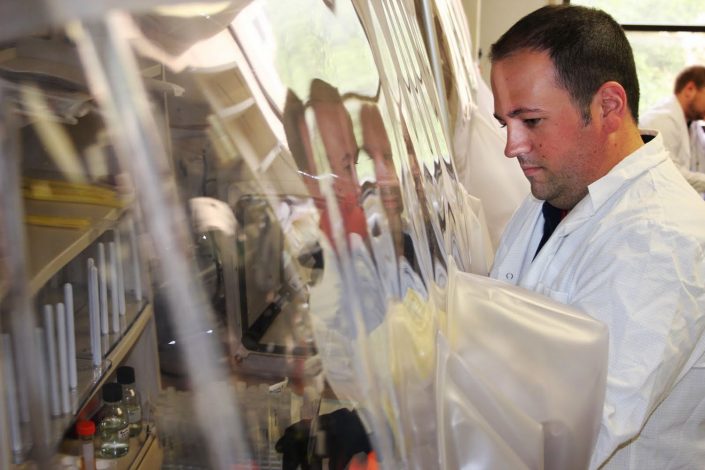A&M-led team develops genetic system to mutate deadly gut bacteria

Image: College of Science
To a man with a hammer, everything looks like a nail. To a Texas A&M University biologist with the powerful gene-editing tool CRISPR, it looks like the hammer is about to drop on one of the most notorious superbugs of our time, Clostridium difficile.
The spore-forming bacterial human pathogen better known as C. diff currently ranks as the No. 1 hospital-acquired infection and a leading cause of related death. It lives in the human gut, typically in small numbers and harmlessly until people are prescribed antibiotics for long periods of time. In the process of fighting infection, these antibiotics indiscriminately kill good gut bacteria along with the bad — a scenario that enables C. difficile to rapidly multiply unchecked while also releasing toxins that cause life-threatening diarrhea, high fever and severe inflammation of the colon.
A potential solution is on the horizon, thanks to a team of scientists led by Texas A&M biologist Joseph Sorg that has applied CRISPR technology to develop a new genetic system to rapidly and easily introduce mutations into the C. difficile genome. Their research, funded by multiple grants from the National Institutes of Health, is published today (Nov. 7) in the current edition of the Nature journal Scientific Reports.
“The ability to genetically manipulate a pathogen allows for in-depth analysis of how that organism causes disease,” Sorg said. “Unfortunately, introducing mutations into the C. difficile genome has been difficult in the past and typically takes a bit of time. We hope that this new genetic system will allow the C. difficile research community to easily and rapidly introduce mutations into the C. difficile genome.”
Because of C. difficile’s multi-drug resistance and the fact that its spores can live outside the human body for extended periods, Sorg says the bacterium has become the scourge of healthcare settings, where it can spread beyond infected hosts via contaminated bedding and equipment and even healthcare providers and unsuspecting visitors.
Sorg has been working since his postdoctoral days to unlock C. difficile’s basic science, from its physiology to its virulence. He earned his doctorate in microbiology at the University of Chicago in 2006, the same year the C. difficile genome was sequenced, and since has emerged as one of the pioneers of C. difficile study. A member of the Texas A&M Department of Biology since 2010, Sorg currently works alongside his own students — including study co-authors Kathleen McAllister ’15, who is pursuing her doctorate in microbiology, and Jennifer Kahn ’18, a senior health major — to develop effective antimicrobials and preventative techniques capable of combating the devastating pathogen.
“Our CRISPR-Cas9 genetic modification tool, we believe, will greatly impact the C. difficile field in the advancement of our general understanding of C. difficile physiology and development of novel therapeutics against this pathogen,” McAllister said. “Hopefully, our system will help researchers spend less of their valuable time on making mutants and more on characterizing mutants and understanding how this bug functions.”

